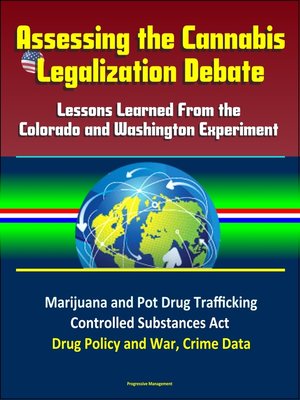Assessing the Cannabis Legalization Debate
ebook ∣ Lessons Learned From the Colorado and Washington Experiment--Marijuana and Pot Drug Trafficking, Controlled Substances Act, Drug Policy and War, Crime Data
By Progressive Management

Sign up to save your library
With an OverDrive account, you can save your favorite libraries for at-a-glance information about availability. Find out more about OverDrive accounts.
Find this title in Libby, the library reading app by OverDrive.



Search for a digital library with this title
Title found at these libraries:
| Library Name | Distance |
|---|---|
| Loading... |
This important report has been professionally converted for accurate flowing-text e-book format reproduction. Cannabis is illegal as far as federal law is concerned; yet recent trends in the United States indicate it is moving toward more widespread legalization. While both sides of the legalization debate pose valid arguments, it has been difficult to assess aspects of these arguments in the past. Now that Colorado and Washington have fully legalized cannabis, what does data demonstrate to support or rebut these arguments and what problems have sporadic legalization led to in the drug control space? This study examines regulatory, financial, and criminal data in Colorado and Washington to identify advantages and disadvantages of legalizing cannabis. Findings indicate commercialization of legal cannabis creates a sizeable economic stimulus due to demand satisfaction and displacement of drug trafficking organizations for supply. Crime levels increased as compared to national averages while drug arrest rates remained stable, which could be influenced by other factors. Overall, as a result of disparate national policy, Colorado and Washington have become source states for cannabis distribution as findings indicate spillage of legal cannabis into black markets nationally. This study recommends rescheduling cannabis in the Controlled Substances Act to further research the drug while increasing state civil asset forfeiture options in prohibitionist states to facilitate criminal enforcement.
Chapter II of this study examines some of the more prominent aspects of the cannabis legalization debate by synthesizing available literature as it pertains to regulation, finance, and crime. Specifically, it synthesizes local legalization perspectives in Colorado and Washington as they have been reported. Understanding the local area perspectives in these states, this chapter further expands to encompass literature addressing regulation, enforcement, health, taxation, banking, and crime. These areas of review have all been impacted by cannabis legalization in some manner. Understanding the current conversation lends to greater understanding of the argument; however, also understanding the history behind the issue is an important step because it highlights how this nation has arrived at this juncture. In terms of future policy, considerable benefit can be garnered in understanding how this country has arrived at this point. Mistakes, as well as sound strategies, help influence good decisions in the future. Accordingly, Chapter III provides the historical context behind the debate.
Chapter IV provides a comprehensive discussion about the data that is analyzed and discussed in Chapter V. Chapter VI synergizes historical information and analysis of current data to provide concluding thoughts about the debate in hindsight of the legalization in Colorado and Washington. Chapter VI also provides recommendations for overcoming the major negative findings of cannabis legalization in Colorado and Washington. The next section of this chapter highlights the methodological approach used to analyze the data for this study.







